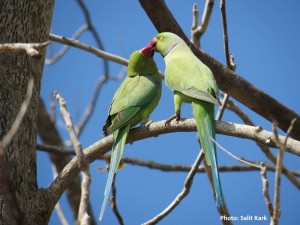Shared from UQ News (https://www.uq.edu.au/news/article/2017/01/alien-birds-follow-global-wealth-and-power):
16 January 2017
The spread of introduced bird species around the world has mirrored the rise of global power and wealth, according to a new study that has mapped the movement of alien bird species.
The international collaborative study found that Australia, New Zealand, Japan, Taiwan, Hong Kong, USA, Caribbean, UK, and Persian Gulf States were notable global hotspots for alien bird species.
UQ School of Biological Sciences researcher, and ARC Future Fellow Associate Professor Salit Kark said the collaborative international study, published in PLOS Biology, suggested more alien birds had historically been introduced to areas where incomes were higher.
“Owning a bird was a symbol of status and cultural connection during colonial times, and often introduced caged birds have escaped or been released into the wild,” she said.
“The rate of alien bird species introductions increased sharply in the mid-19th century as Europeans exported birds to new territories and regions, including Australia and New Zealand,” she said.
“More than half of all known alien bird introductions occurred after 1950 and were most likely driven by the popularity of owning birds such as parrots, finches and others.
“These historical factors are the main reason why the global map shows most alien bird species today are found in the mid-latitudes, where former British and other colonies and countries with high gross domestic product (GDP) are located.”
The researchers have created over the past decade an open access database after collecting and analysing global data on the introduction and establishment of almost 1000 alien bird species introduced by humans to areas outside their native range between the years of 1500 and 2000.
Lead author Professor Tim Blackburn of the University College London said the study provided insights into the different stages of species invasion and how humans had played a key role, along with environmental factors in allowing alien bird species to thrive in new locations.
“Our work shows how humans have been moving these alien bird species around for the past 500 years and why some areas end up with more species than others,” he said.
Associate Professor Kark said the study was especially important for islands, such as Australia and the UK, due to the negative impacts of some alien invasive species on threatened native species in island environments.
“While substantial efforts have been allocated to studying the impacts of invasive mammals, more research needs to be undertaken to understand the spatial patterns and the processes shaping alien invasive birds,” Associate Professor Kark said.
“The study provides evidence-based information that helps direct future conservation and management decisions and actions across multiple regions around the world.”
The international study involved researchers from University College London, ZSL, the University of Queensland, the University of Adelaide, the University of Cambridge, the University of Exeter, and Imperial College London.
Media: Associate Professor Salit Kark, s.kark@uq.edu.au.




